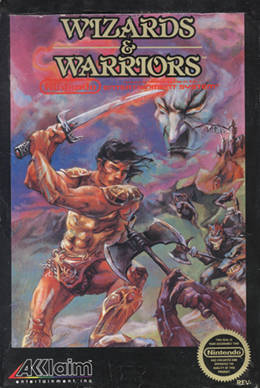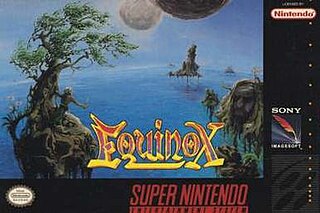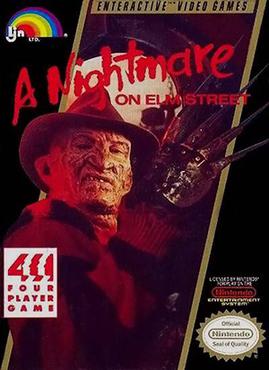
A video game, also known as a computer game or just a game, is an electronic game that involves interaction with a user interface or input device to generate visual feedback from a display device, most commonly shown in a video format on a television set, computer monitor, flat-panel display or touchscreen on handheld devices, or a virtual reality headset. Most modern video games are audiovisual, with audio complement delivered through speakers or headphones, and sometimes also with other types of sensory feedback. Some video games also allow microphone and webcam inputs for in-game chatting and livestreaming.

In video games, a boss is a significantly powerful NPC created as an opponent to players. A fight with a boss character is commonly referred to as a boss battle or boss fight. Bosses are generally far stronger than other opponents the players have faced up to that point in a game. Boss battles are generally seen at climax points of particular sections of games, such as at the end of a level or stage or guarding a specific objective. A miniboss is a boss weaker or less significant than the main boss in the same area or level, though usually more powerful than the standard opponents and often fought alongside them. A superboss is generally much more powerful than the bosses encountered as part of the main game's plot and is often an optional encounter. A final boss is often the main antagonist of a game's story and the defeat of that character usually provides a positive conclusion to the game. A boss rush is a stage where players face multiple previous bosses again in succession.

Cliff Bleszinski, popularly known as CliffyB, is an American video game designer, known for his work on the Unreal and Gears of War series while at Epic Games. After leaving Epic in 2012, he co-founded Boss Key Productions in 2014 which closed in 2018 after the commercial failure of the multiplayer shooter LawBreakers. Since Boss Key's closure, Bleszinski has spent his time with theater and writing.

A keychain is a big ring or chain of metal to which several keys can be attached. The length of a keychain allows an item to be used more easily than if connected directly to a keyring. Some keychains allow one or both ends to rotate, keeping the keychain from becoming twisted, while the item is being used.

Kung-Fu Master, known as Spartan X in Japan, is a side-scrolling beat 'em up developed by Irem and released as an arcade video game in 1984. It was distributed by Data East in North America. Designed by Takashi Nishiyama, the game was based on Hong Kong martial arts films. It is a loose adaptation of the Jackie Chan, Sammo Hung and Yuen Biao film Wheels on Meals (1984), called Spartan X in Japan, with the protagonist Thomas named after Jackie Chan's character in the film. The game is also heavily inspired by the Bruce Lee film Game of Death (1972), which was the basis for the game's concept. Nishiyama, who had previously designed the side-scrolling shooter Moon Patrol (1982), combined fighting elements with a shoot 'em up gameplay rhythm. Irem and Data East exported the game to the West without the Spartan X license.
Megalomania is an obsession with power and wealth, and a passion for grand schemes.
A boss key, or boss button, is a special keyboard shortcut used in PC games or other programs to hide the program quickly, possibly displaying a special screen that appears to be a normal productivity program. One of the earliest implementations was by Friendlyware, a suite of entertainment and general interest programs written in BASIC and sold with the original IBM AT and XT computers from 1982 to 1985. When activated, an ASCII bar graph with generic "Productivity" and "Time" labels appeared. Pressing F10 again would return to the Friendlyware application.

Nintendo Entertainment Analysis & Development Division, commonly abbreviated as Nintendo EAD and formerly known as Nintendo Research & Development No.4 Department, was the largest software development division within the Japanese video game company Nintendo. It was preceded by the Creative Department, a team of designers with backgrounds in art responsible for many different tasks, to which Shigeru Miyamoto and Takashi Tezuka originally belonged. Both served as managers of the EARD studios and were credited in every game developed by the division, with varying degrees of involvement. Nintendo EAD was best known for its work on games in the Donkey Kong, Mario, The Legend of Zelda, F-Zero, Star Fox, Animal Crossing, Pikmin, and Wii series.

Wizards & Warriors, titled Densetsu no Kishi Elrond in Japan, is an action platform video game developed by Rare and published by Acclaim Entertainment for the Nintendo Entertainment System. It was released in North America in December 1987, and in Europe on January 7, 1990. The player controls Kuros, "Knight Warrior of the Books of Excalibur", as he sets out in the Kingdom of Elrond to defeat the evil wizard Malkil. Malkil holds the princess of Elrond captive in Castle IronSpire, deep within the forests of Elrond. The player fights through forests, tunnels, and caves, while collecting keys, treasure, weapons, and magic items.

Equinox is an action adventure puzzle video game developed by Software Creations and published by Sony Imagesoft for the Super NES. A sequel to Solstice (1990) for the Nintendo Entertainment System, Equinox depicts Glendaal saving his father Shadax, the previous game's playable character, from the imprisonment of Sonia, Shadax's apprentice. The player acts as Glendaal, exploring 458 rooms in eight underground dungeons. The player collects 12 blue orb tokens while solving puzzles, killing enemies, collecting keys, navigating platforms and blocks, and battling bosses. It continues Solstice's isometric puzzle game style, with greater emphasis on action adventure and Mode 7 overworld map.
New Game Plus, also New Game+ (NG+), is an unlockable video game mode available in some video game titles that allows the player to restart the game's story with all or some of the items or experience gained in the first playthrough. New Game Plus modes are typically unlocked after completing the game's story at least once and sometimes contain certain features not normally available in the initial playthrough, such as increased difficulty, altered combat or encounters, and more.
Arjan Brussee is a Dutch video game programmer and entrepreneur. He was the main coder of the first two Jazz Jackrabbit games and co-founded Guerrilla Games and Boss Key Productions. He is often credited with being the first successful Dutch game developer.
Big Boss or The Big Boss may refer to:
Fancy Pants is a series of free side-scrolling Flash games created by American developer Brad Borne. Four worlds have been released so far. World 1 was released on March 14, 2006 and World 2 was released on January 9, 2008. After the 2009 Comic-Con, Borne announced he would officially start working on World 3. It was released on April 5, 2012. A console version developed by Borne and Over the Top Games was released by EA 2D for PlayStation Network and Xbox Live Arcade on April 19 and April 20, 2011, respectively. An iOS version developed by Chillingo, Over the Top Games and Borne Games was released on the Apple App Store on March 4, 2012, with an Android version released on May 22, 2017. In 2017, Brad Borne made a fourth entry, Super Fancy Pants Adventure, which was later ported to Adobe Flash in 2020 as World 4.

A Nightmare on Elm Street is a video game released on the Nintendo Entertainment System in 1990 based on Wes Craven's slasher film of the same name. The game was developed by Rare and published by LJN. It should not be confused with an unrelated game with the same title for the Commodore 64 and IBM PC released in 1989.

Sonic After the Sequel is a 2013 platform video game created by Brazilian student Felipe Daneluz (LakeFeperd). It is an unofficial game based on the Sonic the Hedgehog series and set between the official games Sonic the Hedgehog 2 and Sonic the Hedgehog 3. Daneluz's second Sonic game, it follows Sonic Before the Sequel, which is set between the original Sonic the Hedgehog and Sonic the Hedgehog 2. Like its predecessor, After the Sequel stars Sonic the Hedgehog and his sidekick Tails in a quest to retrieve the Chaos Emeralds from Doctor Eggman.

Boss Key Productions, Inc. was an American video game developer based in Raleigh, North Carolina. Founded in April 2014 by Cliff Bleszinski and Arjan Brussee, formerly of Epic Games, the company developed LawBreakers (2017) and Radical Heights (2018), both of which were commercial failures, effectively leading to the closure of the development team in May 2018.










